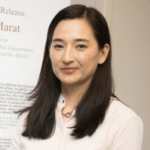In recent weeks, Central Asia’s democratic poster child, Kyrgyzstan, has been a hive of activity. Projects supported by the president, Sadyr Japarov, have won huge majorities in parliament and been rushed through the legislative process. The support has been so overwhelming that even members of parliament who are locked up in prison or have died have somehow managed to vote for or propose them.
But there is nothing supernatural occurring in Kyrgyzstan. These events are all part of the same backsliding on rule of law and respect for democratic rights that have been taking place for months. That decline recently prompted Freedom House to classify Kyrgyzstan as “not free” for the first time in 11 years – threatening a country that has long been seen as model of civil society and freedom in a region calcified by authoritarians and ageing dictators.
At the heart of that decline is the new populist president, Sadyr Japarov – who with a strong social media following and taste for nationalist policies has been labelled the “Kyrgyz Trump”. Last October, during protests against the then President, Japarov was sprung from jail. He had been serving a 10-year prison sentence after he was convicted of taking hostages during a protest. He swiftly became prime minister and used his influence to force out the then president and declared himself acting president prior to receiving approval from parliament.
Russia — with ties to Kyrgyzstan including a military base — has been keen to preserve Russian influence in the resource-rich country by backing Japarov. He, in turn, has thanked Moscow for the “special role Russia played in the stabilisation” of the country’s political crisis.
Referendum on new constitution
Now, Putin-style, the new president is looking to consolidate his power by rushing the passage of a new constitution that will drastically increase the power of the presidency and restrict freedom of assembly.
To halt Kyrgyzstan democratic decline the changes to the constitution must be shelved until parliamentary elections can take place, and procedures allowing for review and input from experts and the public can be followed. Only if those conditions are respected will a new constitution have legitimacy.
The EU must leverage its close relationship with Kyrgyzstan to prevent the only parliamentary system in Central Asia from sliding deeper into authoritarianism. The EU should warn Bishkek of possible implications on funding streams and preferential trade relations should Kyrgyzstan fail to follow its international commitments to democratic principles.
In addition to the legal opinion recently published by the Council of Europe Venice Commission on the draft constitution, the EU parliament must defer ratification of the Enhanced Partnership and Cooperation Agreement with Kyrgyzstan.
In its current form the proposed constitution is little more than a thinly veiled power grab that drastically increases the power of the presidency at the expense of parliament. Articles of the draft constitution would allow the president remove members of parliament, strip individual members of parliament of immunity from prosecution, and allow the president to appoint members of cabinet.
It would also open the door to further abuses with the president being allowed to appoint judges, the prosecutor general, and half of the Central Election Committee. Given that Japarov has already shown himself willing to break with norms on the transfer of power this is a deeply worrying development.
Crack down on civil society
The new constitution would also crack down on civil society, which has been a vital part of the country’s response to the current pandemic. Last summer as healthcare infrastructure collapsed under the burden of soaring numbers of COVID cases, it was civil society organization and volunteers who rushed to fill the gap, providing hospitals with PPE, bringing oxygen tanks to COVID patients, and tracking capacity at hospitals.
The new constitution envisions putting expansive financial reporting conditions on these organizations to limit and control their movements. Even more worryingly, it allows the government to use vague “morale and ethical values” to regulate civic activity, making many activists worry that will be used to silence feminist and other progressive initiatives.
These restrictions and others requiring the advanced approval of protests remind activists in Kyrgyzstan of measures adopted by Russian President Vladimir Putin years ago as a way to crack down on opposition on monopolize political power. In the years that have followed Russia and authoritarian leaders in the region have promoted similar measures in the region as a way impede reform. What made Kyrgyzstan stand out previously in international rankings of freedom and openness was rejecting that trend.
If the status quo in Kyrgyzstan is further disrupted, it will restrict the political system that has allowed half a dozen political parties to be represented in parliament in this ethnically and linguistically diverse country. If parliament stops being a venue for addressing that diversity it may lead to violent street clashes between Japarov’s government and opposition parties as other avenues for expressing dissent are closed off.
So far Japarov’s plan allows for only limited consultation and parliamentary debate on the new constitution before it is put to a national referendum on April 11. That plan breaches all parliamentary procedures bypassing the public hearings and review by constitutional experts before moving ahead and doesn’t allow the public to understand what they are being asked to approve. They should have the right to not only approve or reject, but to shape and understand what they are being asked to vote on.
The EU and its member states must call on Japarov to preserve a parliamentary system with limited presidential powers as defined by the current constitutional, and not stand by as — with Putin’s support — the fragile flame of democracy in Central Asia is extinguished.


